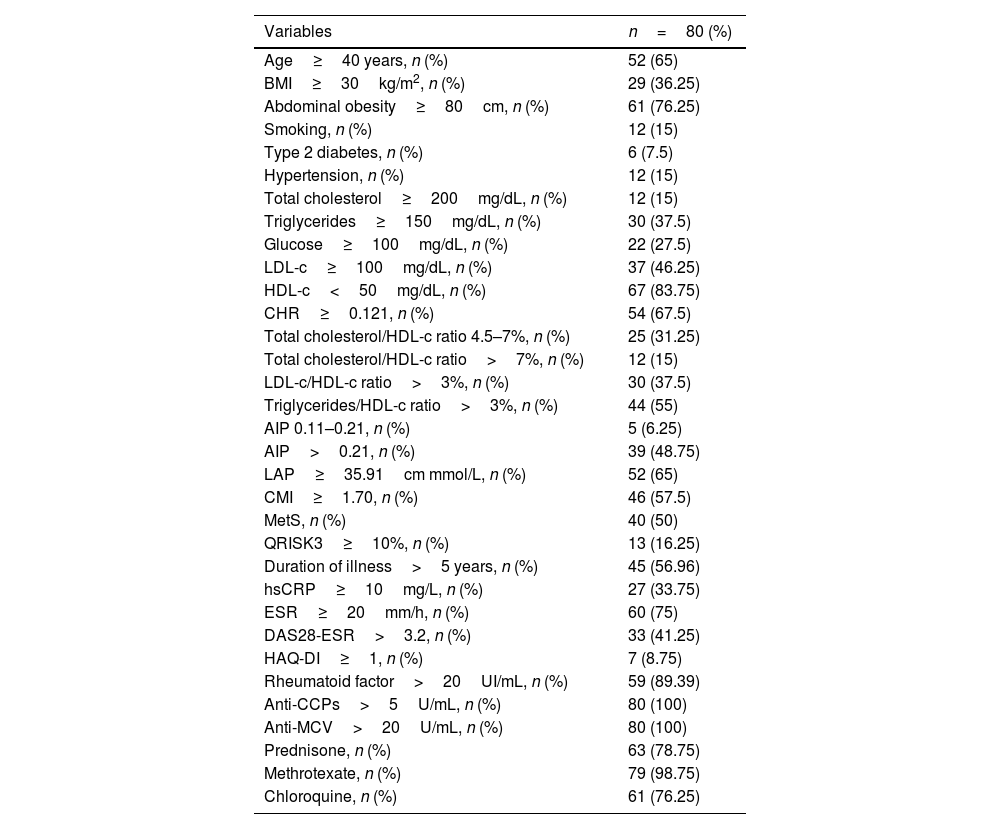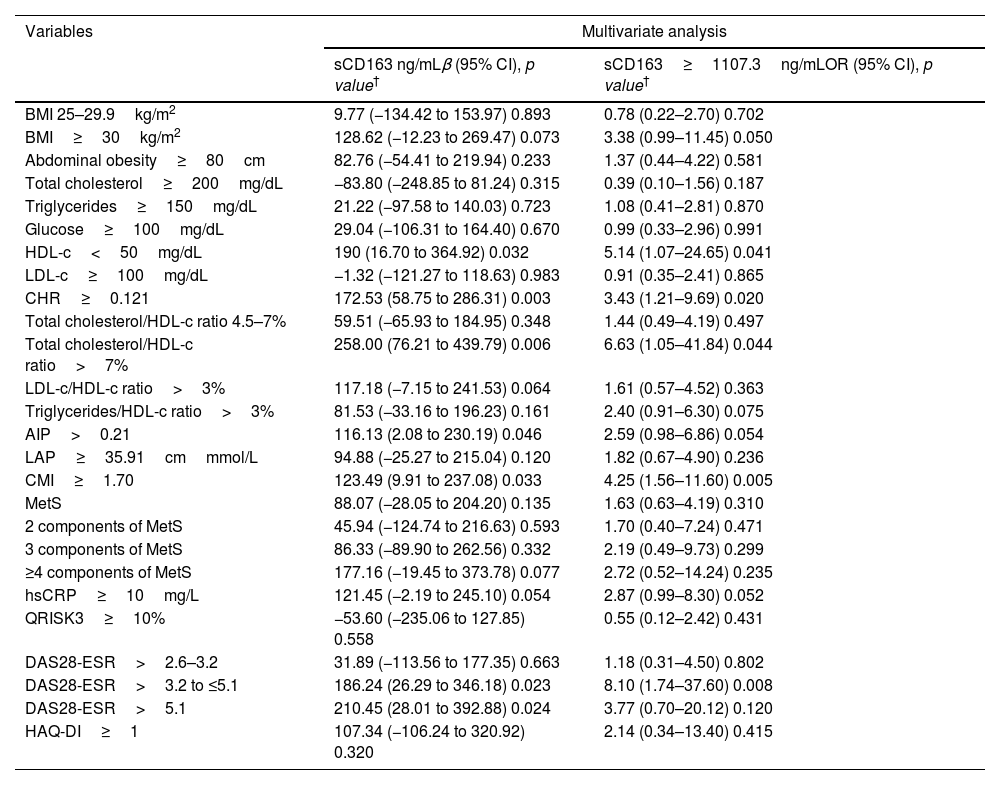The soluble scavenger receptor differentiation antigen 163 (sCD163), a monocyte/macrophage activation marker, is related to cardiovascular mortality in the general population. This study aimed to evaluate their relationship between serum levels of sCD163 with cardiovascular risk indicators in rheumatoid arthritis (RA).
MethodsA cross-sectional study was performed on 80 women diagnosed with RA. The cardiovascular risks were determined using the lipid profile, metabolic syndrome, and QRISK3 calculator. For the assessment of RA activity, we evaluated the DAS28 with erythrocyte sedimentation rate (DAS28-ESR). The serum levels of sCD163 were determined by the ELISA method. Logistic regression models and receiver operating characteristics (ROC) curve were used to assess the association and predictive value of sCD163 with cardiovascular risk in RA patients.
ResultsLevels of sCD163 were significantly higher in RA patients with high sensitivity protein C-reactive to HDL-c ratio (CHR)≥0.121 (p=0.003), total cholesterol/HDL-c ratio>7% (p=0.004), LDL-c/HDL-c ratio>3% (p=0.035), atherogenic index of plasma>0.21 (p=0.004), cardiometabolic index (CMI)≥1.70 (p=0.005), and high DAS28-ESR (p=0.004). In multivariate analysis, levels of sCD163≥1107.3ng/mL were associated with CHR≥0.121 (OR=3.43, p=0.020), CMI≥1.70 (OR=4.25, p=0.005), total cholesterol/HDL-c ratio>7% (OR=6.63, p=0.044), as well as with DAS28-ESR>3.2 (OR=8.10, p=0.008). Moreover, levels of sCD163 predicted CHR≥0.121 (AUC=0.701), cholesterol total/HDL ratio>7% (AUC=0.764), and DAS28-ESR>3.2 (AUC=0.720).
ConclusionSerum levels of sCD163 could be considered a surrogate of cardiovascular risk and clinical activity in RA.
El antígeno de diferenciación del receptor carroñero soluble 163 (sCD163), un marcador de activación de monocitos/macrófagos, está relacionado con la mortalidad cardiovascular en la población general. Este estudio tuvo como objetivo evaluar su relación entre los niveles séricos de sCD163 con indicadores de riesgo cardiovascular en la artritis reumatoide (AR).
MétodosSe realizó un estudio transversal en 80 mujeres diagnosticadas con AR. El riesgo cardiovascular se determinó mediante el perfil lipídico, el síndrome metabólico y la calculadora QRISK3. Para la evaluación de la actividad de la AR, evaluamos el DAS28 con velocidad de sedimentación globular (DAS28-VSG). Los niveles séricos de sCD163 se determinaron mediante el método ELISA. Se utilizaron modelos de regresión logística y la curva de características operativas del receptor (ROC) para evaluar la asociación y el valor predictivo de sCD163 con el riesgo cardiovascular en pacientes con AR.
ResultadosLos niveles de sCD163 fueron significativamente mayores en pacientes con AR con elevado índice proteína C reactiva de alta sensibilidad/HDL-c (CHR)≥0,121 (p=0,003), cociente colesterol total/HDL-c>7% (p=0,004), cociente c-LDL/c-HDL>3% (p=0,035), índice aterogénico del plasma >0,21 (p=0,004), índice cardiometabólico (CMI)≥1,70 (p=0,005) y DAS28-VSG elevado (p=0,004). En el análisis multivariado, los niveles de sCD163≥1.107,3ng/ml se asociaron con CHR≥0,121 (OR=3,43; p=0,020), CMI≥1,70 (OR=4,25; p=0,005), cociente colesterol total/cHDL>7% (OR=6,63; p=0,044), así como con DAS28-ESR>3,2 (OR=8,10; p=0,008). Además, los niveles de sCD163 predijeron CHR≥0,121 (AUC=0,701), cociente colesterol total/HDL>7% (AUC=0,764) y DAS28-ESR>3,2 (AUC=0,720).
ConclusiónLos niveles séricos de sCD163 podrían considerarse un marcador subrogado del riesgo cardiovascular y la actividad clínica en la AR.











